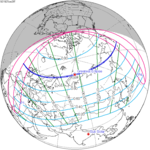Solar eclipse of June 17, 1928
Appearance
| Solar eclipse of June 17, 1928 | |
|---|---|
| Type of eclipse | |
| Nature | Partial |
| Gamma | 1.5107 |
| Magnitude | 0.0375 |
| Maximum eclipse | |
| Coordinates | 65°36′N 70°36′E / 65.6°N 70.6°E |
| Times (UTC) | |
| Greatest eclipse | 20:27:28 |
| References | |
| Saros | 155 (1 of 71) |
| Catalog # (SE5000) | 9346 |
A partial solar eclipse occurred on June 17, 1928. A solar eclipse occurs when the Moon passes between Earth and the Sun, thereby totally or partly obscuring the image of the Sun for a viewer on Earth. A partial solar eclipse occurs in the polar regions of the Earth when the center of the Moon's shadow misses the Earth.
Related eclipses
Solar eclipses 1924-1928
This eclipse is a member of a semester series. An eclipse in a semester series of solar eclipses repeats approximately every 177 days and 4 hours (a semester) at alternating nodes of the Moon's orbit.[1]
The partial solar eclipses on March 5, 1924 and August 30, 1924 occur in the previous lunar year eclipse set, and the solar eclipses on May 19, 1928 and November 12, 1928 occur in the next lunar year eclipse set.
| Solar eclipse series sets from 1924 to 1928 | ||||||
|---|---|---|---|---|---|---|
| Ascending node | Descending node | |||||
| Saros | Map | Gamma | Saros | Map | Gamma | |
| 115 | July 31, 1924 Partial |
−1.4459 | 120 | January 24, 1925 Total |
0.8661 | |
| 125 | July 20, 1925 Annular |
−0.7193 | 130 Totality in Sumatra, Indonesia |
January 14, 1926 Total |
0.1973 | |
| 135 | July 9, 1926 Annular |
0.0538 | 140 | January 3, 1927 Annular |
−0.4956 | |
| 145 | June 29, 1927 Total |
0.8163 | 150 | December 24, 1927 Partial |
−1.2416 | |
| 155 | June 17, 1928 Partial |
1.5107 | ||||
References
- ^ van Gent, R.H. "Solar- and Lunar-Eclipse Predictions from Antiquity to the Present". A Catalogue of Eclipse Cycles. Utrecht University. Retrieved 6 October 2018.
External links
- Earth visibility chart and eclipse statistics Eclipse Predictions by Fred Espenak, NASA/GSFC
Wikimedia Commons has media related to Solar eclipse of 1928 June 17.




